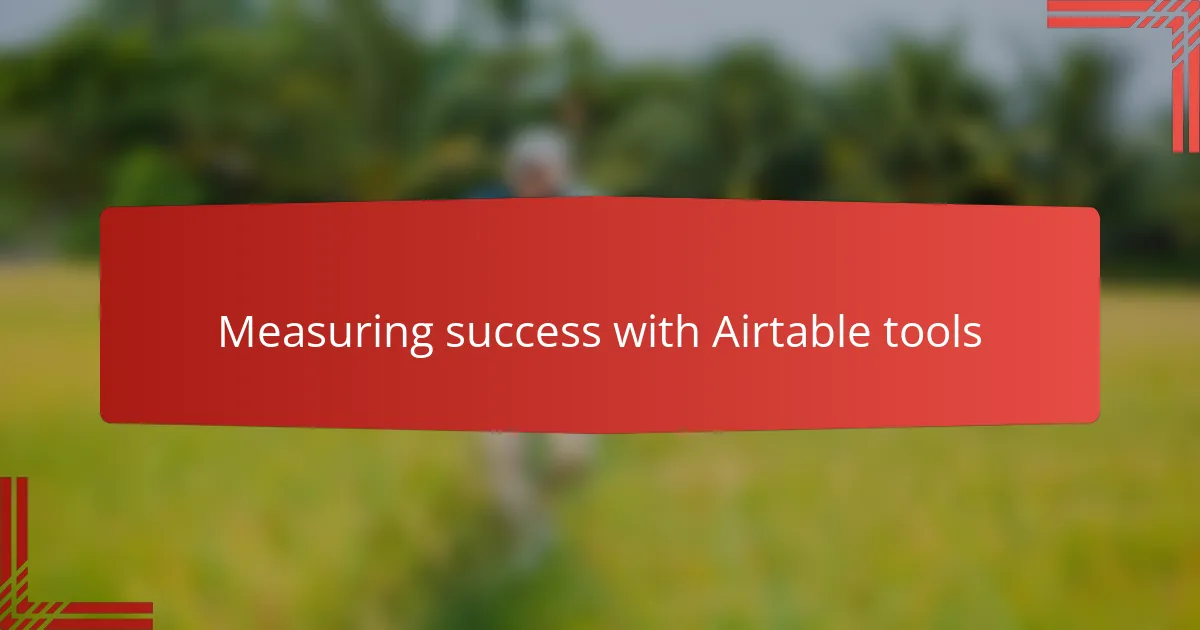Key takeaways
- Community life coaching fosters deeper connections and collective growth, emphasizing shared success and support.
- Airtable enhances coaching by offering a flexible, organized platform for tracking goals and engaging clients visually.
- Personalized goal strategies using Airtable allow for adaptive workflows, making coaching responsive to individual client needs.
- Measuring success with Airtable combines quantitative data and qualitative insights, providing a comprehensive view of client progress.

Understanding community life coaching
Community life coaching, to me, is about more than just setting goals—it’s about connecting with people on a deeper level. I’ve seen firsthand how this approach helps individuals not only clarify their aspirations but also feel genuinely supported in their journey. Doesn’t everyone deserve someone in their corner who truly understands the unique challenges of their community?
What strikes me most about community life coaching is its focus on collective growth. It acknowledges that our personal success is often tied to the wellbeing of those around us. Have you ever noticed how much easier it is to stay motivated when you know your progress impacts others, not just yourself?
In my experience, this type of coaching creates a space where people feel heard and validated, which is incredibly empowering. It’s like a ripple effect—when one person thrives, the entire community benefits. That sense of shared achievement is what keeps me passionate about this work.

Benefits of goal strategy in coaching
Having a clear goal strategy in coaching transforms vague intentions into actionable steps. I’ve noticed that when clients have a structured plan, their confidence grows because they know exactly what to focus on next. Isn’t it amazing how clarity can turn uncertainty into motivation?
Goal strategy also provides a way to measure progress, which is crucial for maintaining momentum. I remember a client who felt stuck for weeks until we broke down their big goal into smaller milestones. Suddenly, every little win became fuel for their journey forward, making the process feel more encouraging and less overwhelming.
Finally, a solid strategy creates accountability, which I’ve found to be a game-changer. When clients commit to specific actions and timelines, it’s easier to stay on track and adjust when life throws curveballs. Don’t you think having that kind of support helps turn dreams into reality?

Introduction to Airtable for coaching
When I first discovered Airtable, I was struck by how it blends the simplicity of a spreadsheet with the power of a database. For coaching, this means you can organize client goals, track progress, and manage resources all in one place without feeling overwhelmed. Have you ever wished for a tool that adapts to your unique coaching style rather than forcing you into rigid templates?
What really sold me on Airtable is its flexibility. I remember setting up custom views for different clients—one preferred visual timelines, another liked detailed checklists—and Airtable made that effortless. It’s like having a personalized command center that grows with your coaching practice, helping both coach and client stay aligned.
Beyond just tracking tasks, Airtable invites creativity and connection. I’ve seen how sharing real-time updates with clients builds trust and keeps motivation high. Don’t we all perform better when we feel seen and supported every step of the way?
![]()
Setting up Airtable for goal tracking
Setting up Airtable for goal tracking starts with creating a base tailored to the specific needs of each client. I like to begin by outlining their main goals and then breaking those into smaller, manageable tasks within different tables. Have you ever felt overwhelmed by too many details? Airtable helps me avoid that by keeping everything organized and visually clear.
One feature I can’t live without is the ability to add custom fields, like deadlines, progress status, and priority levels. This way, I capture the full picture and adjust plans as life unfolds. I remember a client who struggled to stay motivated until we color-coded progress; suddenly, their journey felt more tangible and exciting.
Another step that’s been a game changer is setting up filtered views and automations. By customizing how goals appear and sending reminders when deadlines approach, I create a system that feels proactive, not reactive. Isn’t it empowering to watch your goals come to life with just a few clicks? That’s the kind of control Airtable brings to goal tracking.

Using Airtable to enhance client engagement
Using Airtable to enhance client engagement has been a revelation in my coaching practice. I’ve noticed how clients respond positively when they can see their progress visually mapped out, which makes their efforts feel recognized and valued. Isn’t it amazing how a simple visual cue can boost motivation and deepen commitment?
One thing that stands out to me is how Airtable’s sharing features invite transparency and collaboration. By giving clients access to their own dashboards, it feels less like a top-down process and more like a shared journey. I remember a client telling me that seeing real-time updates made them feel more involved and accountable—something that emails or static reports never achieved.
What I truly appreciate is how Airtable encourages ongoing dialogue. Clients leave comments, update statuses, and even add new goals as they evolve, which turns engagement into an active conversation rather than a one-time check-in. Have you experienced that shift from passive receiving to active participation? Airtable made that possible in my sessions, and it’s been transformative.

Personalizing goal strategies with Airtable
What I find powerful about personalizing goal strategies with Airtable is how it honors each client’s unique rhythm and needs. Instead of fitting someone into a one-size-fits-all model, I get to build custom workflows that resonate deeply with where they are in their journey. Have you ever noticed how tailoring an approach makes goals feel less like chores and more like meaningful steps forward?
One client of mine, for example, thrived when we used Airtable to map not only milestones but also mindset shifts alongside practical tasks. This blend created a space that felt both structured and compassionate—a combination that kept motivation alive even during tough days. It’s like having a coaching partner who listens and adapts, right there in the digital space.
What amazes me is how easily Airtable lets me adjust strategies on the fly. Life is unpredictable, and goals often need reshaping. With Airtable, making those tweaks is seamless, so clients never feel stuck or left behind. Doesn’t that sound like the kind of flexibility every coaching relationship deserves?

Measuring success with Airtable tools
What really stands out to me about measuring success with Airtable tools is how they turn abstract progress into concrete data. I’ve had moments where clients couldn’t quite grasp if they were moving forward until we visualized their milestones with Airtable charts and progress bars. Suddenly, success wasn’t just a feeling—it was something we could see and celebrate together.
Tracking progress in Airtable also brings clarity to what’s working and what needs adjusting. I recall a client who, through filtering and sorting their completed tasks, realized they were stuck on one specific habit. Having that insight early helped us pivot the strategy before frustration set in. Isn’t it reassuring to have that kind of immediate feedback during a coaching journey?
Besides numbers and graphs, Airtable’s ability to log qualitative feedback adds depth to measuring success. When clients update their experience or mood alongside task completion, it paints a fuller picture of their growth. From my perspective, this balance between data and human insight is what makes Airtable a truly powerful tool for tracking meaningful progress.